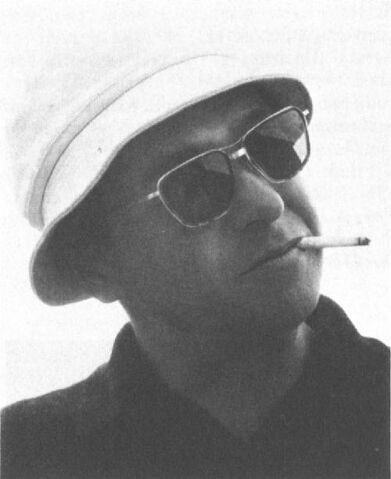Masaki Kobayashi
小林正樹

Masaki Kobayashi was born in the small fishing village of Otaru, Hokkaido, in 1916. In 1933, at the age of seventeen, Kobayashi won entrance to Waseda University in Tokyo. There he studied Asian Art Forms and Philosophy. When he graduated in 1941, the Pacific War had commenced. Kobayashi was cognisant of the dangers of the war, and as such joined the Shochiku company as “In art history I knew that it would require many more years of painstaking research for me to make a contribution, and the war made the future too uncertain. But with film, I thought there might be a chance of leaving something behind.” His stay was short-lived however. Kobayashi was drafted into the war in 1942, and in the duration he would see the indefensible war crimes of the Japanese Imperial Army, the 'reds', and the Americans, including being a POW on Okinawa for a year.
This experience of the war would become Kobayashi's focus in film-making alongside his interest in art.
On arriving back in Japan in 1946, Kobayashi reapplied to the Shochiku Company. He was protracted to become Keisuke Kinoshita's assistant director. Kobayashi worked on Kinoshita's films until finally being promoted to the role of a fully-fledged director in 1952. However, Kobayashi's early films are still marked by Kinoshita (and his family); who often oversaw the script, music, and other features of production.
Kobayashi's first real production featuring his own vision, was Anata Kaimasu [1956]. A critique of the pro-baseball business as fraudulent and morally corrupt, it would give viewers a glimpse of what would come. His next film, Black River [1957], was the start of Kobayashi career in film of exposing the shortcomings of society. The film details the satellite settlements springing up around an American base and the prostitution, black marketing, and general lawlessness found there.
Black River was well received, or perhaps more infamous, for its incisive deconstructive critique of Japanese society. However, for both the critics and Kobayashi, it was simply a preamble for his next project, titled "The Human Condition" [1959-1961]. The Human Condition was actually a set of three films, each over three hours long. The expansive narrative follows a Japanese man Kaji, a pacifist eventually drafted into the war. While Kaji's experiences are radically different from Kobayashi's, undoubtedly Kaji becomes Kobayashi's avatar. Kobayashi has said at one point "I am Kaji".
The release of The Human Condition made Kobayashi famous worldwide, though to some extent because of the length of The Human Condition. The Human Condition is "one of the least seen and known cinema masterpieces."
Kobayashi’s heroes “all face a system of rigid values, a system in which they have given place and a code of behaviour they are expected to follow." The act of becoming an individual and discovering one’s own way is the raison d’étre of Kobayashi’s central characters—he has “maintained a consistent rebellion against the central traditions of the Japanese way of life” in films that “rise clear of simple social criticism into the realm of major art.”
This is evident especially in his next major film, "Harakiri" in 1962. Winning the Cannes Jury Prize, the film details a scathing denouncement of the hypocrisy of 16th century feudal Japan.
By now Kobayashi had become cemented as a Master of Cinema. Further cementing this fact, he would release Kwaidan in 1964, which again won him the Cannes Jury Prize. However, Kwaidan was the point in which Kobayashi mainly retired his cinema of social critique. Kobayashi would say of Kwaidan "my main intention in the film was to explore the juxtapositionbetween man's material nature and his spiritual nature, the realm of dream and aspiration [...] I had come to the end of pursuing realism in film".
His subsequent films however, showed this tendency died hard. "Jouichi" [1967], and "The Youth of Japan" [1968] were again social critiques. Donald Richie has said of Kobayashi "he is more interested in society than people, and sacrifices character for action."
Finding himself in a declining industry in the 70's, Kobayashi unsuccessfully tried to collaborate in "The Club of Four Knights" [Kurosawa, Ichikawa, Kinoshita, and Kobayashi]. Leaving Shochiku, Kobayashi managed to work on some eclectic projects, such as his internationally filmed television mini-drama "Kaseki" [1972], and "Moeru Aki" [1979].
Kobayashi then worked on a documentary analysing the Pacific War war trials. Kobayashi would end his career on a light note with the almost comedic "The Empty Table", though it still had elements of Kobayashi's trademark societal criticism.
Please discuss his films or your view of him here!
Filmography
1985 The Empty Table / Shokutaku no nai ie / 食卓のない家
1983 The Tokyo Trials / Tokyo saiban / 東京裁判
1979 Glowing Autumn / Moeru aki / 燃える秋
1975 Kaseki / 化石
1971 Let's Throw Away Life / Inochi bô ni furô / いのちぼうにふろう
1968 The Youth of Japan / Nihon no seishun / 日本の青春
1967 Jouichi / Samurai Rebellion / 上意討ち 拝領妻始末
1964 Kwaidan / Kaidan / 怪談
1964 The Entanglement / The Inheritance / Karami-ai / からみ合い
1962 Harakiri / Seppuku / 切腹
1961 The Human Condition III: A Soldier's Prayer/ Ningen no Joken III / 人間の條件・完結篇
1959 The Human Condition II: Road to Eternity / Ningen no Joken II / 人間の條件・第三・第四部
1959 The Human Condition I: No Greater Love / Ningen no Joken I / 人間の條件・第一・第二部
1957 Black River / Kuroi kawa / 黒い河
1956 I'll Buy You / Anata kaimasu / あなた買います
1956 The Fountainhead / Izumi / 泉
1955 Beautiful Days / Uruwashiki saigetsu / 美わしき歳月
1954 Somewhere Beneath the Wide Sky / Kono hiroi sora no dokoka ni / この広い空のどこかに
1954 Three Loves / Mittsu no ai / 三つの愛
1953 Sincere Heart / Magokoro / まごころ
1953 Room With Thick Walls / Kabe atsuki heya / 壁あつき部屋
1952 My Son's Youth / Musuko no seishun / 息子の青春 |
